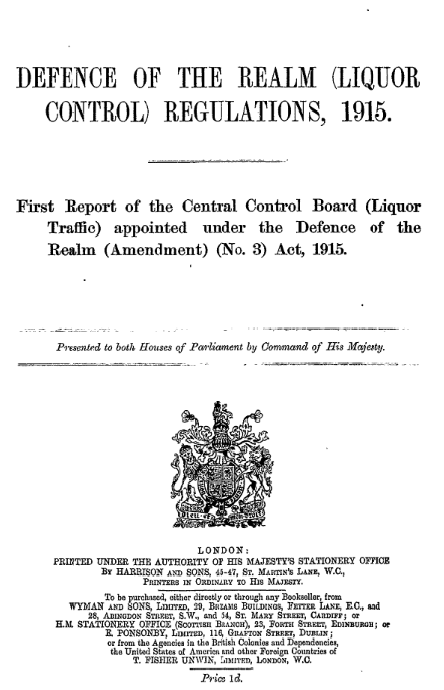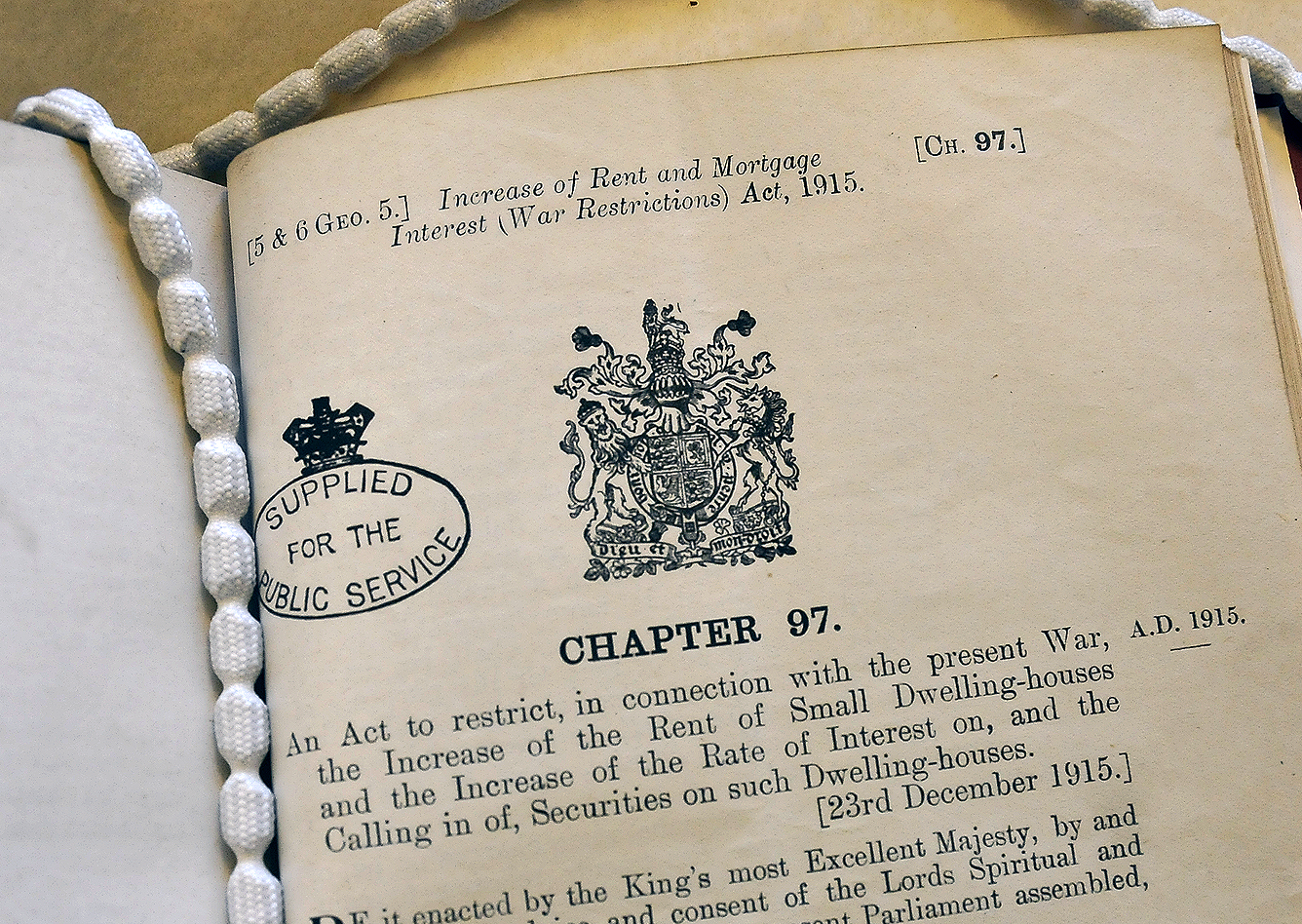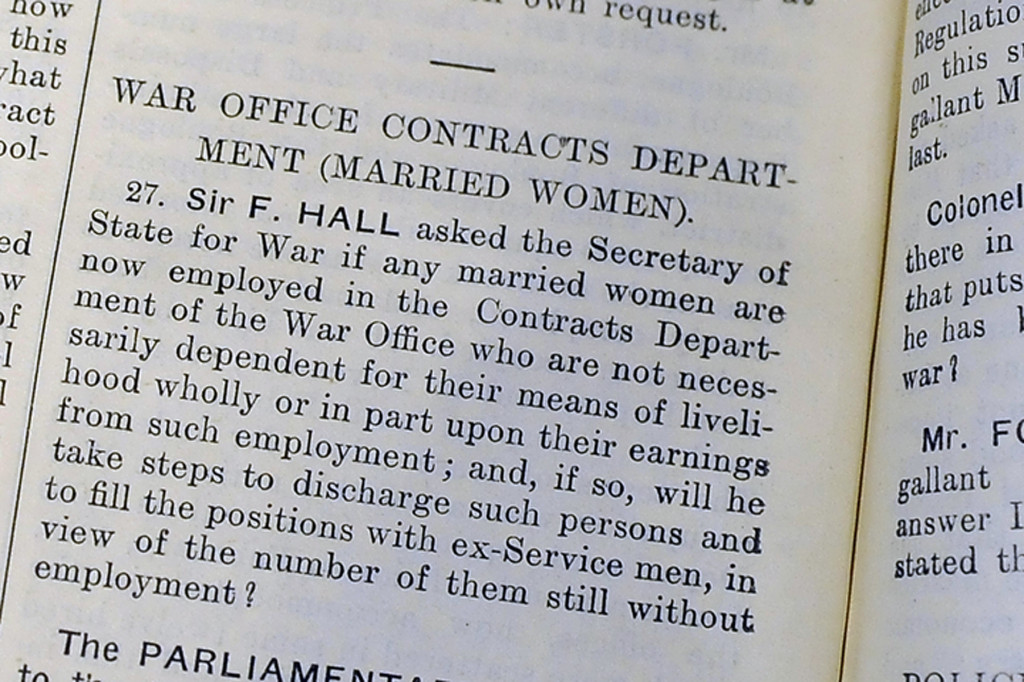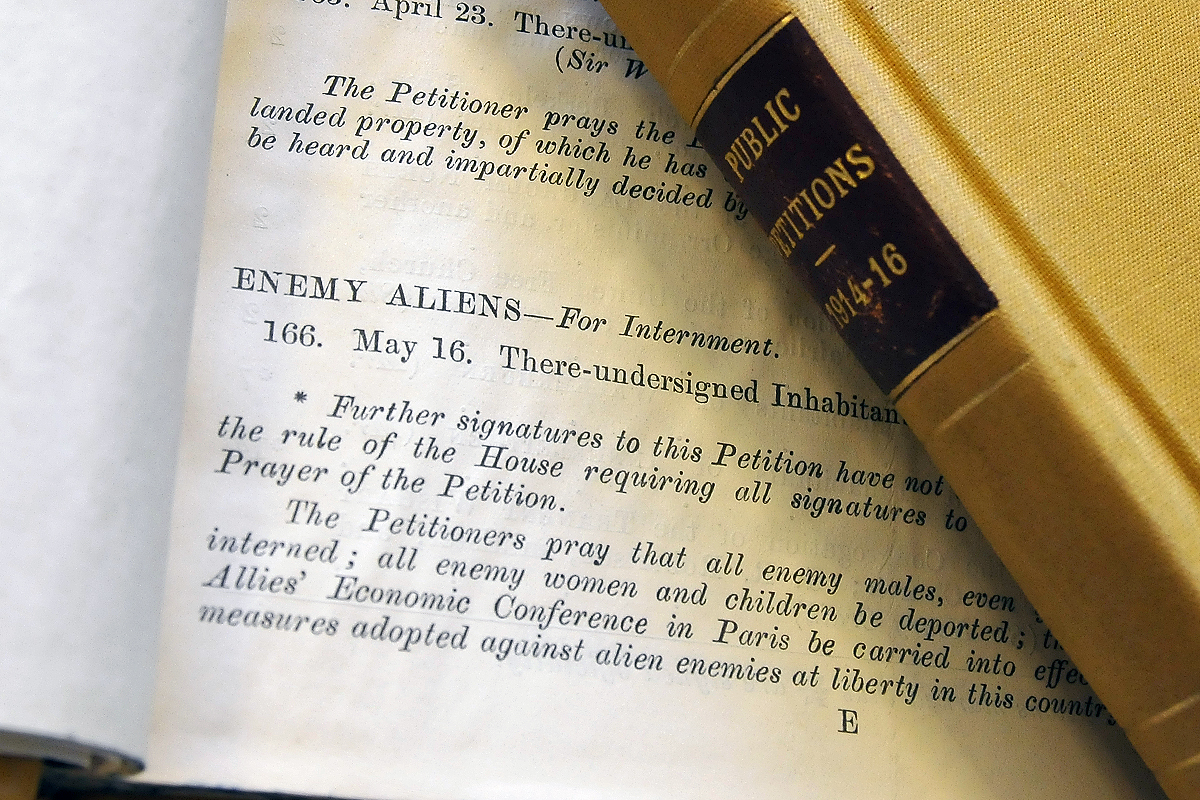This is part of a series of blog posts highlighting some of the sources we have in the IHR library on the subject of this year’s Anglo-American conference, The Great War at Home. We have a range of sources covering all aspects of the war on the home front from letters, diaries and memoirs, newspapers accounts, business, estate and administration records. Here we focus on the parliamentary records.
The Home Front features heavily across all the parliamentary sources, including the journals and debates, petitions, reports of committees and commissions and Acts of Parliament. The parliamentary debates as recorded in Hansard, are an especially rich source for daily life during the war because MPs often raised concerns on behalf of their constituents or with their experiences in mind.
Provision of food… and drink
 Food shortages, food prices and rationing were a source of anxiety and there is much discussion of the issues around agriculture, transportation, import restrictions and food availability.
Food shortages, food prices and rationing were a source of anxiety and there is much discussion of the issues around agriculture, transportation, import restrictions and food availability.
Some discussions were more concerned with the effects of alcohol. From 1915 the Defence of the Realm (Liquor Control) regulations allowed local authorities to prohibit people from buying drinks for others. In October Basil Peto, Conservative MP for Devizes, urged the government to extend the “no treating” rule across the UK. Hansard reported his Commons speech: “the injury to the health and efficiency of the men of His Majesty’s land and sea forces when on furlough.. [is] directly attributable to the hospitable instincts of their friends” (House of Commons Hansard, Fifth Series, Volume 74, 14th October, 1915 column 1464).
Accommodation problems
 Steps were taken to ensure that households could continue to support themselves. There were protests over tenants being threatened with eviction due to rent increases, particularly those families with soldiers at the front. Discussions can be found in Hansard. In 1915 an Act was passed to restrict “in connection with the present War, the Increase of the Rent of Small Dwelling-houses”.
Steps were taken to ensure that households could continue to support themselves. There were protests over tenants being threatened with eviction due to rent increases, particularly those families with soldiers at the front. Discussions can be found in Hansard. In 1915 an Act was passed to restrict “in connection with the present War, the Increase of the Rent of Small Dwelling-houses”.
James Thomas, Labour MP for Derby took up the case of railway workers who needed temporary lodgings as they were moved around the country. In July 1917 he asked the President of the Board of Trade if he was aware that
“railway locomotive men and guards throughout the country, and particularly on the Great Western system, are experiencing hardship when booked off duty away from home, owing to the difficulty under prevailing conditions of obtaining lodgings and food; that a number of Great Western goods guards, after on several occasions walking about for hours at night seeking lodgings and food in vain, and in one case having to proceed to the workhouse for accommodation, are now refusing to be booked off for rest away from home when unprovided with food, and in consequence are being punished by the railway company, which action threatens to bring the whole system into a state of revolt; and whether, therefore, he will at once consult with the Railway Executive Committee and endeavour to find a remedy, either by placing the responsibility of providing food and lodgings in all such cases upon the railway companies or by such other means as may be found practicable?”. (House of Commons Hansard, Fifth Series, Volume 96, Written answers (Commons) 19th July, 1917, column 607)
A pressing need in 1919 was to find housing for demobilized soldiers. Frederick Macquisten, Conservative MP for Glasgow Springburn, questioned: “the number of military and munition camps with comfortable and roomy hutments provided with electric lighting, gas and heating, water and drainage, play centres, and halls.. and the number of returned soldiers who have no houses for themselves and their families and would gladly now reside in these camps in preference to having the prospect of residing in subvented houses which will take long to materialise”. (House of Commons Hansard, Fifth Series, Volume 121, 11th November, 1919)
German Nationals resident in the UK
The parliamentary records reveal a lot about both official and private attitudes to Germans and other foreigners living in Britain. Thousands of people signed petitions asking for Enemy Aliens to be interned, at the same time that MPs were hearing about the poor provision of food for foreign nationals already interned in Alexandra Palace. In November 1915 the Home Secretary intervened to prevent one particular German woman from being repatriated:
“Miss Groschel is a lady of forty-three, who has lived in this country since she was nineteen, is devotedly attached to England, and has no friends to whom she could go or means of livelihood in Germany. To deport such a woman to a country where she would be friendless and penniless and exposed to suspicion and insult on account of her affection for England, would be an act of extreme harshness”. (House of Commons Hansard, Fifth Series, Volume 75, 3rd November, 1915)
Send women workers home!
 An essential part of the war effort was that women filled many jobs vacated by men who were called up for military service, often in occupations which had traditionally been closed to females. There is much discussion with Trade Unions about ensuring that men’s employment rights were retained. After the war there were conflicting messages about whether women might continue to hold these jobs. In 1919 one Act (Sex Disqualification Removal Act) appeared to allow it, at least in certain circumstances—no person should be “disqualified by sex or marriage” from any civil or judicial office or post or any civil profession or vocation—while another (Act to make provision with respect to the restoration after the war of certain trade practices) restored pre-war restrictions.
An essential part of the war effort was that women filled many jobs vacated by men who were called up for military service, often in occupations which had traditionally been closed to females. There is much discussion with Trade Unions about ensuring that men’s employment rights were retained. After the war there were conflicting messages about whether women might continue to hold these jobs. In 1919 one Act (Sex Disqualification Removal Act) appeared to allow it, at least in certain circumstances—no person should be “disqualified by sex or marriage” from any civil or judicial office or post or any civil profession or vocation—while another (Act to make provision with respect to the restoration after the war of certain trade practices) restored pre-war restrictions.
Conscientious objectors
Parliamentary petitions can show the strength of local feeling over particular issues in wartime. In June 1917 some 300 people requested an inquiry into the case of Frank Bimson, held under guard at Chester Castle after being taken “by the military authorities for service which he cannot conscientiously perform”. The petition explained how Frank had been “wholly devoted to religious work in the township of Newton in Makerfield for over five years”. (Reports of the Select Committee of the House of Commons on Public Petitions, Session 1917-18, Second Report on Public Petitions, 29 March – 23 July, 1917)
For more information about our Parliamentary sources and where to find them, see our guide to UK Parliamentary sources.

